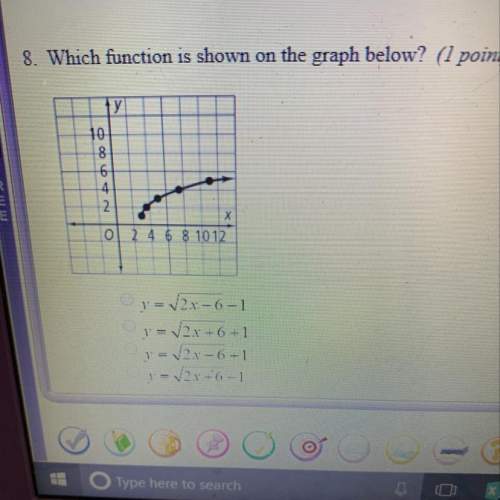
Mathematics, 06.03.2020 23:46 ashleyrobles2676
Trainees must complete a specific task in less than 2 minutes. Consider the probability density function below for the time ittakes a trainee to complete the task.
f(x) = 0.67 - 0.17x 0 < x < 2
1.What is the probability a trainee will complete the task inless than 1 minutes? Give your answer to four decimalplaces.
2.What is the probability that a trainee will complete the task inmore than 1 minutes? Give your answer to four decimal places.
3.What is the probability it will take a trainee between 0.68minutes and 1 minutes to complete the task? Give your answer tofour decimal places.
4. What is the expected time it will take a trainee to complete thetask? Give your answer to four decimal places
5.If X represents the time it takes to complete the task, what isE(X2)? Give your answer to four decimal places.
6.If X represents the time it takes to complete the task, what isVar(X)? Give your answer to four decimal places.

Answers: 2


Another question on Mathematics

Mathematics, 21.06.2019 17:00
(! ) three cylinders have a height of 8 cm. cylinder 1 has a radius of 1 cm. cylinder 2 has a radius of 2 cm. cylinder 3 has a radius of 3 cm. find the volume of each cylinder
Answers: 1

Mathematics, 21.06.2019 21:30
Hannah paid $3.20 for 16 ounces of potato chips. hank paid $3.23 for 17 ounces of potato chips. who paid less per ounces?
Answers: 1

Mathematics, 22.06.2019 01:00
Jack is considering a list of features and fees for current bank: jack plans on using network atms about 4 times per month. what would be jack’s total estimated annual fees for a checking account with direct paycheck deposit, one overdraft per year, and no 2nd copies of statements? a. $44 b. $104 c. $144 d. $176
Answers: 3

Mathematics, 22.06.2019 03:10
Which of the following statements are true? (select all that apply.) a quasi-static process is one in which the system is never far from being in equilibrium. when a system can go from state 1 to state 2 by several different processes, the amount of heat absorbed by the system will be the same for all processes. the internal energy of a given amount of an ideal gas depends only on its absolute temperature. when a system can go from state 1 to state 2 by several different processes, the work done on the system will be the same for all processes. when a system can go from state 1 to state 2 by several different processes, the change in the internal energy of the system will be the same for all processes. for any substance that expands when heated, its cp is greater than its cv.
Answers: 2
You know the right answer?
Trainees must complete a specific task in less than 2 minutes. Consider the probability density func...
Questions

Mathematics, 21.08.2020 14:01


Mathematics, 21.08.2020 14:01


Biology, 21.08.2020 14:01


English, 21.08.2020 14:01


Mathematics, 21.08.2020 14:01


Chemistry, 21.08.2020 14:01


English, 21.08.2020 14:01

Mathematics, 21.08.2020 14:01


Mathematics, 21.08.2020 14:01







